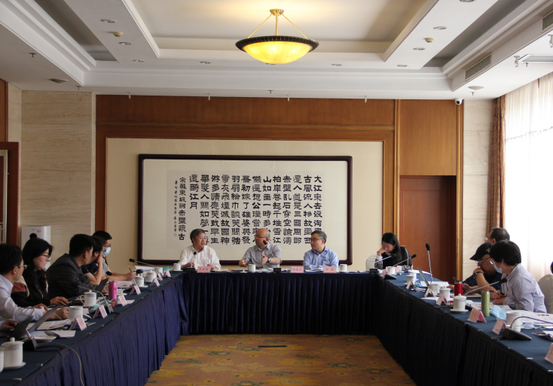Seminar Discussed China’s Air Strategy for Coordinated Protection of the Environment and Climate
With support from Energy Foundation China (EF China), the Chinese Academy for Environmental Planning (CAEP), a think tank overseen by China’s Ministry of Ecology and Environment (MEE), held the mid-term seminar in late May 2021 for its research on the strategy and capacity building for coordinated protection of the environment and climate. Chaired by Xin LIU, Director of the Environment Management Program of EF China, the seminar saw the participation of such experts as Chengchuan TIAN, Vice Director-General of MEE’s Department of General Affairs, Jinnan WANG, President of the CAEP and a member of the Chinese Academy of Engineering, Ji ZOU, CEO and President of EF China, Jie LI, Vice President for Programs of EF China, Wei LI and Jun CAI, Vice Directors of MEE’s Department of Atmospheric Environment, and other experts from the Development Research Center of the State Council, the Energy Research Institute of the National Development and Reform Commission, the National Center for Climate Change Strategy and International Cooperation, Party School of the Central Committee, Peking University, Beijing Normal University, EF China, CAEP, and local environmental bureaus.

President Xi’s announcement at the Climate Ambition Summit that China would update its Nationally Determined Contributions signified that China was more actively pursuing a low carbon development pathway, said Mr. Wang. Besides increasing ambition in intensity and quantity goals, China had also shifted toward the implementation of the goals, according to him. Carbon peaking and neutrality involved every corner of the economy and society, challenging all departments to take an active part in changing their thinking and taking coordinated action for environment quality improvement and climate mitigation. He hoped experts and scholars at the meeting could offer valuable advices on how to increase the synergy of the two important topics.

Mr. Tian said that we should adopt global, systematic, innovative, and economic perspectives as we worked to fight with climate change, protect the ecosystem, and achieve a carbon peak and carbon neutrality. He hoped the participants of the seminar could brainstorm for the strategy for China’s high-quality development, ecological progress, environmental protection, and climate mitigation, and help the effective implementation of the strategy in the next step.

Professor Zou said that as the most populous country, a major economy, and also a major carbon emitter, China needed to make breakthroughs in many technologies, change its development concepts, systems, and tools, and make innovations in many fields, in an effort to increase the synergy of criteria pollutant and carbon reductions. He hoped that this project could take into consideration these factors and ensure better implementation.

Dr Li said that, to realize the long-term goals of carbon neutrality, we should emphasize the synergy between economic growth and environmental protection, between air quality improvement and carbon emissions reductions, and between decision-making and oversight of government agencies. Only on this basis could we ensure effect and efficiency, she said. She expected that this project could play a leading role, provide ideas for long-term climate and environmental improvements, and thus advance standards, methodologies, and other policies.

This project is composed of eight sub-projects, including seven for research and the remaining one for the establishment of the platform for City Air Integrated Management and Low Carbon Action Partnership. Experts at the seminar discussed the findings and next steps of the seven research-oriented sub-projects, which had made good progress. At the national level, the project is proposing China’s air quality improvement and carbon emission reduction targets and measures for coordinated action for the 14th Five-Year Plan (FYP) period, based on a review of the 13th FYP period and analysis on future policy scenarios; presenting suggestions for green transition targets and measures for major industries for the next five years, after an assessment of the impact of the COVID-19 pandemic and analysis of socio-economic outlook for 2025 and 2035; putting forward next-stage targets and strategies for scattered coal use control; and conducting cost benefit analysis on air quality improvement actions planned for the 14th FYP period in energy supply, steel, chemical, building materials, and other major industries, while also proposing cost benefit analysis for carbon peaking actions as well. At the regional level, the project is highlighting coordinated control of PM2.5 and O3, and of criteria and climate pollutants in the greater Beijing-Tianjin-Hebei region during the 14th FYP period, and proposing their control targets and potential control policies; and making policy suggestions for environmental innovation and incentives for the Beijing-Tianjin-Hebei region and the Yellow River Basin. Experts at the seminar gave their honest feedback on the mid-term research findings of the sub-projects.
In his closing remarks, Mr. Liu thanked the experts again, and hoped the project team could refine their research based on the experts’ suggestions and provide scientific evidence for coordinated environmental and climate protection decisions at both national and local levels.
The Chinese Academy for Environmental Planning contributed partial content and provided all photos.




